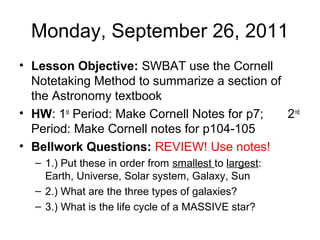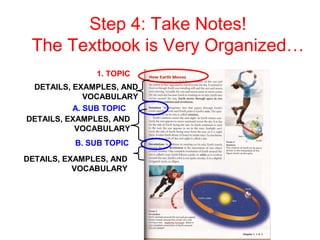G taking notes from textbook (rotation vs revolution)
- 1. Monday, September 26, 2011 ŌĆó Lesson Objective: SWBAT use the Cornell Notetaking Method to summarize a section of the Astronomy textbook ŌĆó HW: 1st Period: Make Cornell Notes for p7; 2nd Period: Make Cornell notes for p104-105 ŌĆó Bellwork Questions: REVIEW! Use notes! ŌĆō 1.) Put these in order from smallest to largest: Earth, Universe, Solar system, Galaxy, Sun ŌĆō 2.) What are the three types of galaxies? ŌĆō 3.) What is the life cycle of a MASSIVE star?
- 2. Taking Notes from Textbook Using Cornell Note-taking Method
- 3. Step One: Proper Heading ŌĆó Write your name, date, class, and period in the upper right hand corner (see above). ŌĆó Write the topic of the notes (ex. WWII, Cells, Nouns, etc.) on the top line (see above). Name Date Class Period
- 4. Step Two: Set Up Your Paper ŌĆó Page setup ŌĆó Draw a horizontal line about five lines up from the bottom. ŌĆó Draw a vertical line down the page about one third of distance from the left. Name Date Class Period
- 5. Step 3: Know what to include! ŌĆó Main Idea ŌĆó Key Question (after notes are completed) ŌĆó Key words & ideas ŌĆó Important dates/people/places ŌĆó Repeated/Stressed Info ŌĆó Ideas/brainstorming written on board / overhead projector ŌĆó Info from textbook/stories ŌĆó Diagrams & Pictures ŌĆó Formulas Name Date Class Period
- 6. Overview of Cornell Method ŌĆó Ch 1 Sec 1: EarthŌĆÖs Movement p7 ŌĆó 1. TOPIC 1 ŌĆō A. SUB TOPIC 1 ŌĆó I. Example ŌĆó II. Vocab-definition ŌĆó III. Detail ŌĆó IV. Example ŌĆó V. Picture ŌĆō B. SUB TOPIC 2 ŌĆó I. Diagram ŌĆó II. Vocab- definition ŌĆó 2. TOPIC 2 ŌĆō A. SUB TOPIC 1 ŌĆó I. Example Name Date Period # Not created until you are reviewing the material Create Review questions, one sentence summaries, etc. After Details are added, summarize the MAIN IDEAS from the left side of the paper in your own words! The MEAT of the notes
- 7. Step 4: Take Notes! The Textbook is Very OrganizedŌĆ” 1. TOPIC A. SUB TOPIC B. SUB TOPIC DETAILS, EXAMPLES, AND VOCABULARY DETAILS, EXAMPLES, AND VOCABULARY DETAILS, EXAMPLES, AND VOCABULARY
- 8. Your Notes will be organized the same wayŌĆ” ŌĆó 1. ŌĆō A. ŌĆó I. ŌĆó II. ŌĆó III. ŌĆó IV. ŌĆó V. ŌĆō B. ŌĆó I. ŌĆó II. ŌĆó 2. ŌĆō A. ŌĆó I. NUMBERS FOR TOPICS (red in Sci Books) LETTERS FOR SUB TOPICS (blue in Sci books) ROMAN NUMERALS FOR DETAILS, EXAMPLES, AND VOCAB WORDS & THEIR DEFINITIONS (You will have to read paragraph(s) and determine what is important to include. Do NOT include everything!!!)
- 9. How to Take Notes from the Textbook 1. TOPIC Ch__ Sec__ (Name of Section) A. SUB TOPIC B. SUB TOPIC I. DETAIL II. DETAIL I. DETAIL II. DETAIL I. DETAIL II. DETAIL A. SUB TOPIC I. DETAIL II. DETAIL I. DETAIL II. DETAIL A. SUB TOPIC B. SUB TOPIC I. DETAIL II. DETAIL A. SUB TOPIC B. SUB TOPIC I. DETAIL II. DETAIL B. SUB TOPIC A. SUB TOPIC I. DETAIL II. DETAIL B. SUB TOPIC A. SUB TOPIC I. DETAIL II. DETAIL B. SUB TOPIC A. SUB TOPIC I. DETAIL II. DETAIL B. SUB TOPICB. SUB TOPIC I. DETAIL II. DETAIL B. SUB TOPIC A. SUB TOPIC I. DETAIL II. DETAIL B. SUB TOPIC A. SUB TOPIC I. DETAIL II. DETAIL I. DETAIL II. DETAIL LetŌĆÖs Do The first two paragraphs of Page 7 togetherŌĆ”
- 10. With your seatmate, Please complete the third paragraph on page 7 in your Notes LetŌĆÖs share!
- 11. Individually and quietly, please complete Cornell Notes for p105- 106. If necessary, please finish for Homework.
- 12. So, what about the bottom of my paper? ŌĆó Summary - review notes as soon as possible after class and write a summary in your own words about the main ideas. Name Date Class Period What belongs in the bottom space? Summary











